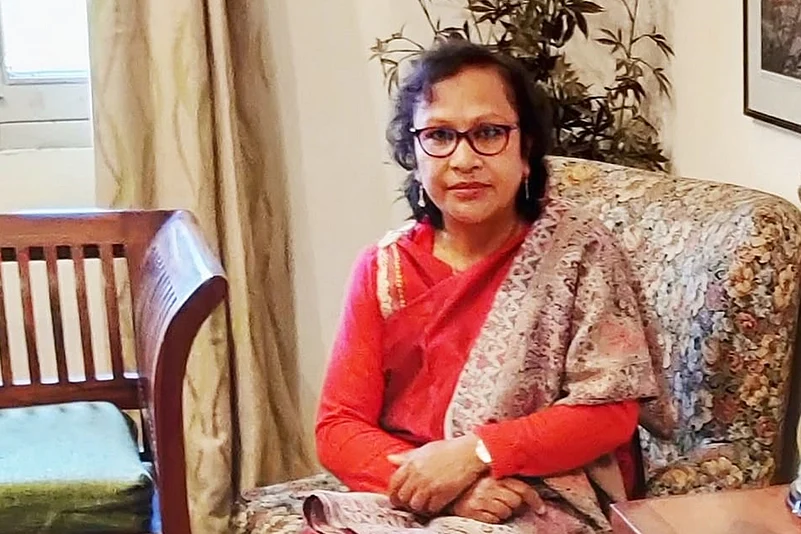The Supreme Court on?March 25?quashed a criminal case registered against Patricia Mukhim, editor of?Shillong Times.?The case was registered in relation to a Facebook post by Mukhim that called for an action against a group of youths who had allegedly attacked a group of non-tribal youths playing basketball in Lawsohtun.
Defamation Law Meant To Curb Free Speech, Needs To Be Revoked: Patricia Mukhim
Patricia Mukhim, editor of ‘Shillong Times’ speaks to Outlook about free speech, the need for journalists to unite, and the criminal case against her that was recently quashed by the Supreme Court.

On?July 3, 2020, Mukhim in a Facebook post had written, “The attackers, allegedly tribal boys with masks on…should be immediately booked. This continued attack on non-tribals in Meghalaya whose ancestors have lived here for decades, some having come here since the British period is reprehensible, to say the least.”
The top court in its order observed that what Mukhim posted “cannot. by any stretch of imagination be considered ‘hate speech'”.
The Padma Shri awardee, had last year resigned from the Editors Guild of India (EGI) for its "complete silence" on the Meghalaya High Court ruling which had refused to quash the FIR against her and held her guilty of creating communal disharmony.
In an interview with Outlook’s Midhat Fatimah, the veteran journalist talks about the case, EGI, and how she finds the law against criminal defamation an impediment in the way of freedom of speech.
Q) The Supreme Court recently quashed the FIR that alleged your Facebook post was intended to create disharmony. How challenging was it for you to fight this case?
Any legal proceeding like this causes stress. The Meghalaya High Court had struck down the appeal to quash the FIR. So, I had to move the Supreme Court. The only relief was that the case was taken up pro bono by lawyer Vrinda Grover. She had reassured me that the FIR doesn’t really hold any ground. But, in any case, any legal proceeding comes with a lot of stress.
Q) When the FIR was filed did you ever think the matter would stretch to the extent where you will have to approach the top court in the country?
No, when the FIR was filed, my lawyer Kaustav Paul, who is also a friend of mine took up the case pro bono because he felt the case was unfair. We were appalled to know about the FIR and thought how could anyone file a case for calling for peace and an end to violence. So, we were very sure the case will be struck down by the high court but when the Meghalaya High Court did not quash the FIR we were very upset and decided to move the Supreme Court.
Earlier too, in contempt of court case against ‘Shillong Times’, Paul took up my case. The high court had fined me and the publisher with Rs 2 lakh each. Later, Vrinda Grover took up the case pro bono when we decided to move the Supreme Court. I wish that we all have such spirited lawyers like Paul and Grover.
Q) How was the support from the journalist fraternity while the case proceedings were going on?
Everyone was very supportive. I am a member of South Asian Women in Media (SAWM) and they even helped me financially. Not just from the media, people from across the board were very supportive except my own community who thinks I am pro-non-tribals and against my own people. So, the trolling still continues even after the Supreme Court pronounced the verdict in my favour. People in Meghalaya accuse me of not taking up the cause of my own people. Some of the trolls are very vicious. But I have taken it all in my stride because I have been writing on the issue for a long time. From 1987 to this date, I have been pleading that non-tribals are a minority in Meghalaya and it is our (tribal community’s) duty to stand for them. We should remember, every person is a majority at someplace and a minority at another place.
Q) India’s rank in the World Press Freedom Index has taken a hit in recent times. What do you think is the future of freedom of speech in India?
At the moment, we are not really free to speak our minds because?today?people are getting booked for sedition and being termed as anti-national even over very flimsy reasons. How can this go on? The judgement in my case reads, “Disapprobation of governmental inaction cannot be branded as an attempt to promote hatred between different communities. Free speech of the citizens of this country cannot be stifled by implicating them in criminal cases unless such speech has the tendency to affect public order”. In a democracy, if the citizens don’t critique the ruling government then what do they do? How can citizens stay quiet when things go wrong?
In a democracy, if citizens will not speak up then we will not get what we are entitled to. When you ask people to write about the fault lines or ask them why don’t they start a people’s movement you will see that nobody wants to do that. Everyone wants to play safe. I don’t think one can have a democracy if they are playing safe all the time.
Q) Working as a journalist is becoming increasingly difficult in India. Do you think there are some initiatives that can be taken by the journalist fraternity?
The problem is that we are so divided as a fraternity?today. Look at those who have become trumpet blowers and apologists for the government. Are they doing journalism? They are already on the side of the government. Now, what kind of journalism is that? The media can never be with the ruling party. So, they are not doing journalism but are still calling themselves journalists.
As far as the rest of the fraternity is concerned, I think we need to be together. There are so many people across the board who believe in free speech, who believe in rule of law, who believe that criticism of the government is an integral part of a democracy. All those who share the same belief should come together and fight a united battle.
I have been calling on the need to approach the Supreme Court and seek revocation of the law against criminal defamation. It is meant to curb our right to free speech and it has been scrapped in many other countries. So, why do we still have this colonial law in India?
Q) After your resignation from the Editors Guild of India, has there been any communication from any of the members?
Some members communicated to me and asked me to withdraw my resignation but I feel that there are other groups I can be a part of, groups that do what they are supposed to. It becomes difficult to be a part of a group that cannot take a strong stance on matters because some members have a right-wing leaning.
- Previous Story
 Samsung Workers Call Off Strike After Extensive Meeting With Company, TN Govt | Explained
Samsung Workers Call Off Strike After Extensive Meeting With Company, TN Govt | Explained - Next Story





















